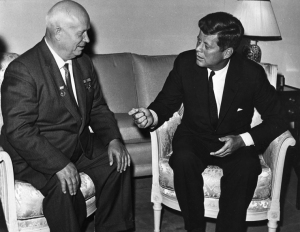I’m most of the way through Robert Caro’s “The Passage of Power,” the latest in his series of Lyndon Johnson biographies. And I’ve been struck by his description of John F. Kennedy’s governing style, and of the similarities to President Obama.
What they share is a daunting intelligence; level-headedness in moments of confusion and anxiety, which served them in good stead when high-stakes foreign-policy decisions had to be made quickly (the Cuban missile crisis, the raid on Osama bin Laden’s compound); and the ability to give a terrific speech, undermined to some degree by their aloof detachment.
The downside? Kennedy comes across as utterly clueless in working the levers of power with Congress, a failing he shares with Obama. Yes, it often appears that the Republicans are going to say no to Obama regardless of what he proposes. But Caro describes a coalition of Republicans and conservative southern Democrats in the early 1960s that was no less intractable than the Tea Party Republicans of today.
Kennedy, Caro writes, concluded that working with Congress was hopeless as he watched his tax-cut bill and civil-rights legislation go nowhere. But when Johnson became president, he engaged in a combination of cajoling, flattery and threats that he mastered in the 1950s as Senate majority leader. What Kennedy had seen as the pragmatic acceptance of reality turned out to be a rationalization of his own shortcomings.
Could Obama have gotten more than he has from Mitch McConnell, John Boehner and Eric Cantor? It seems unlikely. But given Bob Woodward’s description of the president’s hapless dealings with the Republican leadership, perhaps a leader more willing to engage with the opposition could have had better results.
Not to get carried away. It’s hard to imagine a better schmoozer in the White House than Bill Clinton. Yet his tax plan was approved without a single Republican vote — and on health care, Obama succeeded where Clinton failed. (I enjoyed Clinton’s speech last week as much as anyone, but his invocation of the 1990s as a time of bipartisan cooperation was pure fiction. I assume the Big Dog hasn’t forgotten that he was impeached for his personal behavior.)
Still, it’s interesting to think about how the past four years might have been different if Obama was a little less JFK and a little more LBJ.
Photo via Wikimedia Commons, from the U.S. Department of State in the John F. Kennedy Presidential Library and Museum, Boston.
Discover more from Media Nation
Subscribe to get the latest posts sent to your email.


Esther Iris
I think you make a good point about having a president who’s skilled in working and schmoozing with Congress. But honestly, I don’t know how much it would have helped if Obama were more like LBJ. I’m not saying everyone who opposes the president is a racist “but” I think Republicans in Congress do benefit from some of the opposition being race-based. If Republicans work with Obama, the GOP loses some of its most ardent supporters. And they probably gain nothing. So there’s no percentage in it for them. And the days of moderate Republicans are over.
L.K. Collins
You forget, Dan that Clinton’s failure on health care can be laid that the feet of Hillary and her miserable political performance in the bill’s development.
Also, Clinton’s success came when he realized that in order to get things done, he had to use more than just the bully pulpit.
Will Obama change if he is given another term? I have no idea. But I expect he would face as much, if not more, political adversity with a recalcitrant House and a less cooperative Senate.
If he cannot change, his second term, its entire four years, will become the standard for “lame duck”.
Marjorie Arons-Barron
Dan, The Caro book has been sitting on my night table since it came out. This is fascinating, and you have spurred me to take it up.
Dan Kennedy
@Marjorie: Inexcusable, heh, heh. I’ve been slogging through it 25 pages at a time. Well worth it. Thank you.
Cynthia Stead
DK – I, too, am reading Passage to Power, but what the whole cycle of Caro’s books shows is that Barack Obama is no LBJ. He did not have the deprivation described in ‘Passage to Power’ that gave Johnson his ruthless drive. ‘Means of Ascent’ could have been written about Rahm Emanuel, but he served as Obama’s minion, not the principal. Most important, ‘Master of the Senate’ showed HOW Johnson was able to get the dexterity and dirt to make Congress bow to him. Obama left the Senate literally half-baked, with only a superficial knowledge of the institution compared to LBJ and Sam Rayburn – a ‘little knowledge’ that did him more harm than good. Obama was perhaps overly ambitious, and made his grab at power too soon to consolidate backing behind him, thinking that theory would trump experience.
L.K. Collins
Let me add to what Cynthia is saying.
Obama is not blessed with Democratic leaders in either the House or the Senate who have a history, or a willingness to get things done. Pelosi doesn’t have the bi-partisan skills of a Rayburn or a Tip, and Reid has elected to be far more devoted to partisanship than to political progress,.
Clinton was successful because of his partnership with Gingrich, as Regan was with O’Neil. As long as Obama focuses on himself as the political makeweight, he will continue to underachieve.
Mike Rice
“We can’t expect the American people to jump from capitalism to communism but we can assist their elected leaders in giving them small does of socialism until they awaken one day to find that they have communism.” [Nikita Khrushchev]